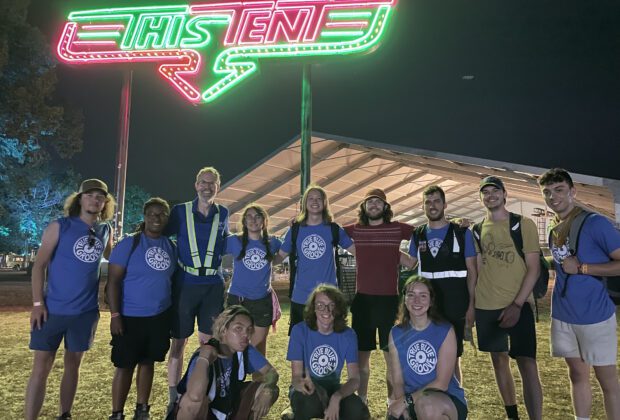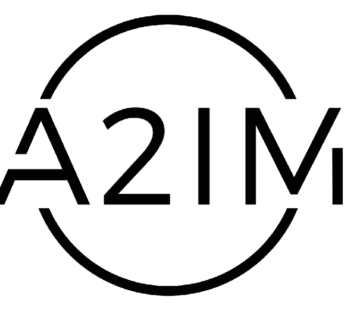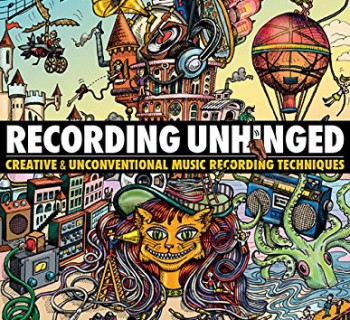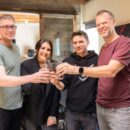Michael Fleming, Professor of Audio Production, Department of Recording Industry (third from left), shown with the MTSU audio team at Bonnaroo 2024.
The Bonnaroo Music and Arts Festival is an annual four-day event that takes place at Great Stage Park, a 700-acre farm in Manchester, Tennessee. Typically starting on the second Thursday of June, the festival runs for four days and features multiple stages with live music spanning various genres. Performances kick off on Wednesday evening for early arrivals and continue throughout the event, starting each day around noon, and some stages entertain attendees until sunrise. This year’s festival was held from June 13-16, and once again the show’s lineup read like a who’s-who in the music industry, with artists like Post Malone, Megan Thee Stallion, Red Hot Chili Peppers, Fred Again, Cage the Elephant, Gary Clark Jr., and more.
On hand were key faculty members from Middle Tennessee State University’s College of Media and Entertainment, including Michael Fleming, Professor of Audio Production, Department of Recording Industry; and Robert Gordon, Associate Professor of Video and Film Production and interim chair of the Department of Media Arts. As part of MTSU’s ongoing initiative to provide students with real-world experience in audio and video production, Fleming and Gordon maintain a partnership with Bonnaroo that began in 2015, when they took students behind the scenes for the first time to shoot multicamera coverage and record festival performances.
Those early efforts were purely archival, but Bonnaroo has offered MTSU an increasingly significant role in its broadcast production in recent years. This summer, the student crew was responsible for both the streamed broadcast coverage and live video feeds to “IMAG” screens for the on-site audience at two of Bonnaroo’s main stages, This Tent and That Tent.
The demands of capturing and streaming dozens of performances on two stages simultaneously occupied a crew of 26 students (thirteen audio and thirteen video) using “The Truck,” the university’s almost $2 million mobile production lab, and a separate flypack. This year, the MTSU team’s video and audio production work from the This Tent and That Tent stages constituted 50% of the content airing across Bonnaroo’s two Hulu streaming channels.
“We did 53 acts over four days, and 23 of those aired on Hulu,” stated Michael Fleming. “In order to achieve high channel counts and efficient signal flow, I ended up employing two key products from Focusrite – three RedNet D64R 64-channel MADI bridges (two of them at This Tent and one at That Tent) and a Focusrite RedNet PCIeNX ultra-low latency, high-channel-count PCIe Dante® interface.”
Fleming elaborates on his setup at Bonnaroo:
“Our broadcast truck audio system is built around a Calrec Brio36 console and Calrec's Hydra2 fiber network for stage boxes and signal transport. We use a Dante network to extend the onboard matrix intercom into the field through fiber-linked switches, and we also use Dante to get audio in and out of the console for multi-track recording and playback when needed.
We received a combination of analog, AES and MADI feeds from the PA companies at Bonnaroo. In particular, we converted those MADI streams to Dante using Focusrite’s D64R units, where asynchronous sample rate conversion allowed us to isolate our clock domains and convert 96 kHz stage splits to 48 kHz for production mixing Those 48k signals flowed into our Dante network and ultimately reached the console through Calrec’s modular Dante-Hydra2 interface card.”
“At our second stage,” Fleming continues, “both video and audio were switched in a flypack without any Calrec-specific audio equipment, so we used a compact Yamaha DM3-D console for stem mixing and a laptop-based DAW for the recording. The DM3-D is Dante-enabled, but its digital IO capability falls short of the total number of stage inputs we anticipated in addition to our audience mics and front of house feeds. We knew that we needed a high-density interface to be able to route and select what’s hitting the console and multi-track DAW at the same time.
The best available solution in this circumstance was the Focusrite RedNet PCIeNX, which provided 128 bi-directional I/O channels. We certainly didn’t use all of that, but the Focusrite interface gave us the stability and capacity as an audio device to interface with Reaper and the Yamaha console and our MADI to Dante interface devices. The system transported the audio exactly the way it should, with low latency and perfect quality. When you’re juggling multi-artist, multi-stage, live stream performances, you have one shot to get it right, and the Focusrite gear delivered.”
Summarizing this year’s Bonnaroo Festival, Fleming stated that it’s a valuable real-world experience for the university on many levels. “Our media arts and audio production programs benefit tremendously from this annual collaboration that immerses us in high-level remote production and live broadcasting. As a result, our students are learning the intricacies of live and post-produced TV production for music performances, while working and becoming familiar with professional gear like Focusrite RedNet products that they will find in similar OB trucks and studios when they graduate and begin their work in the industry.”














